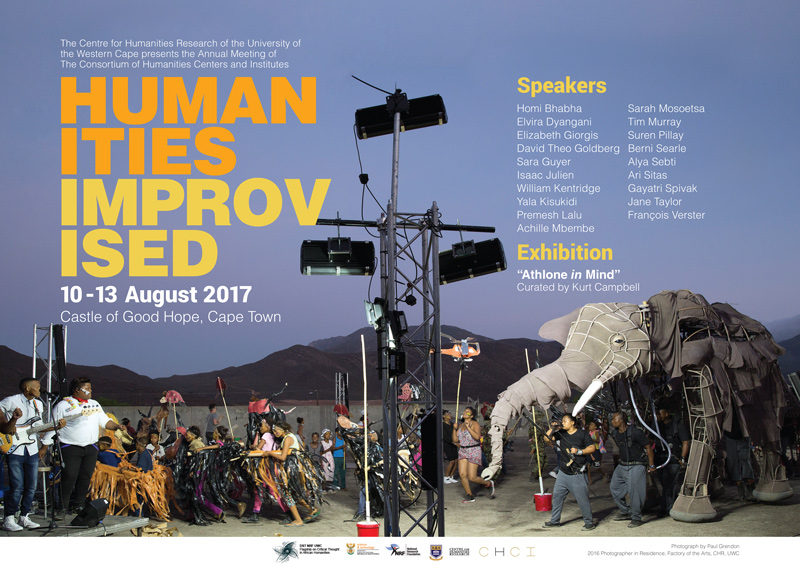
Winter School 8th -13th August 2017: The Humanities Improvised
The Flagship on Critical Thought in African Humanities of the Centre for Humanities Research at the University of the Western Cape (CHR) in collaboration with the SARChI Chair for Social Change at the University of Fort Hare (SARChI) and the Interdisciplinary Centre for Global Change at the University of Minnesota (ICGC), invite you to participate in the 2017 Winter School on the theme “The Humanities Improvised”. The Winter School will take place in Cape Town from August 8th to August 13th 2017 and will be joined to the Annual Conference of the Consortium for Humanities Centres and Institutes (CHCI) taking place from the 10th to the 13th August 2017.
The Humanities Improvised
The 2017 annual meeting of the CHCI will explore the multiple ways in which improvisation has enabled and facilitated the study of the humanities, not least in times of great social upheaval. Under the theme of The Humanities Improvised, the annual meeting aims to gather together artists, art commentators and humanists from member institutions to reconceptualize the relationship between art and the humanities against the backdrop of the rapidly changing world of work, politics and technology. The very concept of the public sphere is being recast in the twenty-first century as a consequence. The CHCI annual meeting will explore these shifts against the backdrop of an African and South African context where debates about nationalism, decolonization, neocolonialism, post-colonialism, globalization and neoliberalism have found complex expression and contestation in burgeoning arts initiatives across the continent, producing possibilities for new models of aesthetic education and cultural critique.
The 2017 CHCI annual meeting revisits the work of improvisation in a context where changes in work, politics and technology appear to have reorganized the repertoire of consciousness, memory and desire that grounds the Humanities. In the midst of the widening chasm between being and becoming, the Humanities in its improvisational mode may reach beyond a process that only archives and preserves foundational narratives. The Humanities, when placed in a longer duration of such artistic forms such as jazz, cinema or the work of art, allows us to set forth in anticipation of the new. With the rise of third generation technologies, the improvisational may precisely enable setting to work on reshaping the Humanities in productive ways. At one level, improvisation may function as a “social instrumentality” under conditions where the relationship between the human and technology, the human and animal, attention and play, and bios and techne are being rearranged in the midst of uncertain futures. At another, improvisation functions as an opening, prompting reorientation, especially as thought and performance press up against the limits of what we conventionally understand as the humanities.
Either way, improvisation may enable more questions for humanities inquiry, and how the study of the Humanities in turn might offer itself as a practice of thought adequate, appropriate and necessary to the demands of a world in flux.
The Winter School
For the 2017 Winter School we invite our students and fellows to participate in a two day series of lectures, together with colleagues from our partner institutions across the African Continent, on the question of the Humanities Improvised. Our speakers for the Winter School are Gayatri Spivak, Renée Ferro, Okechukwe Nwafor, John Mowitt, Baidik Bhattacharya, Brinda Bose and Ana Paula Ferreira. Participants in our Winter School will also be automatically registered for the CHCI conference, and will take part in the lectures and exhibitions attached to it.

